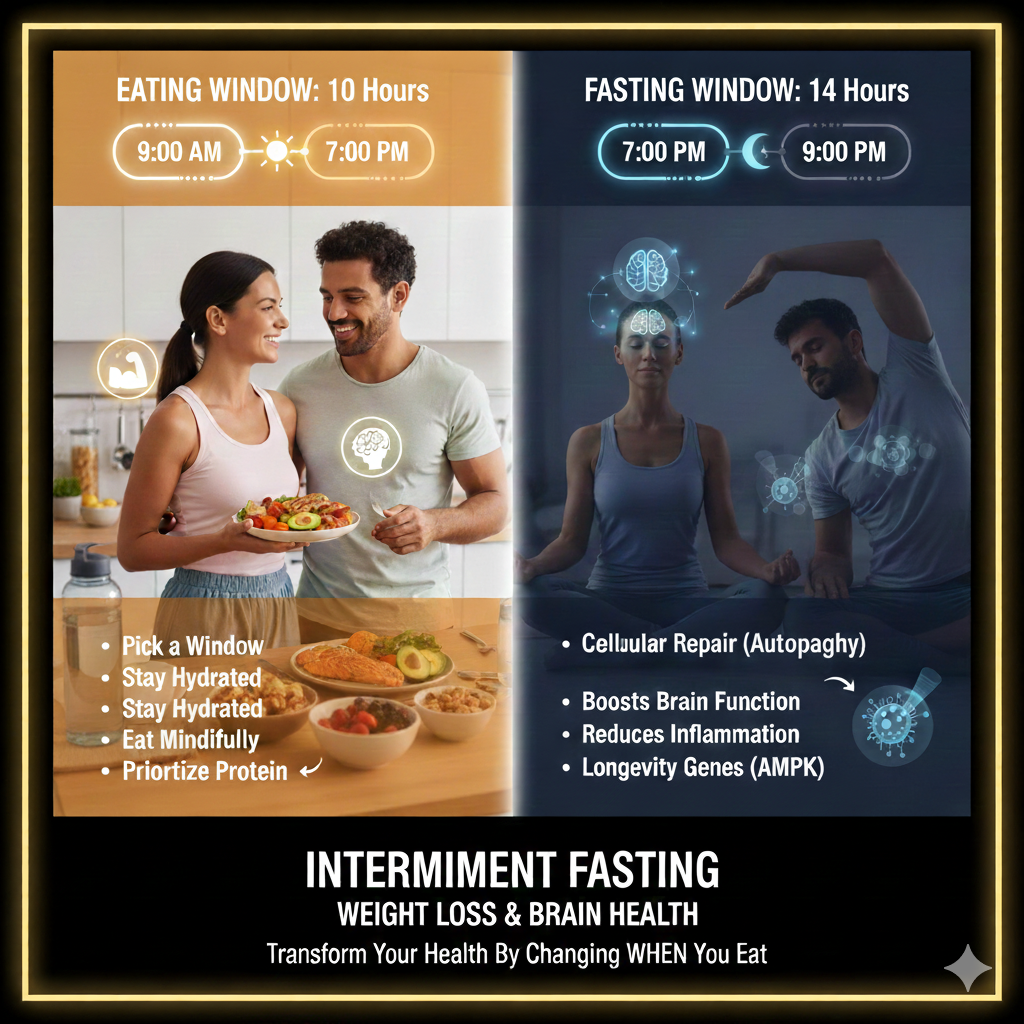Intermittent fasting, aka. time-restricted eating, not only helps with weight loss but also improves brain health and promotes longevity.
If you’ve ever struggled with diets that force you to eat less and constantly battle hunger, there is good news: research shows you may be able to lose weight, and gain powerful health benefits, without reducing the actual amount of food you eat. The secret lies in when you eat, not just what you eat.
What is Intermittent Fasting?
Intermittent fasting, sometimes called time-restricted eating, means consuming all your daily calories within a specific window each day, say 8 or 10 hours,and fasting for the remaining hours. You still enjoy the same foods you love, but simply change the timing.
Backed by Science
Weight Loss & Fat Reduction:
Clinical studies confirm that intermittent fasting can drive impressive weight loss, even without deliberate calorie restriction. Dr. Satchin Panda, a leading researcher on circadian rhythms, has shown that people who confined eating to a daily 8–12 hour window lost weight, reduced belly fat, and improved metabolic health—even when they kept their total calorie intake about the same as before.
Brain Health & Longevity:
Harvard’s Dr. David Sinclair, renowned for aging research, notes that intermittent fasting may stimulate cellular repair, boost brain function, and promote longevity by activating genes linked to healthy aging.
Overall Health Benefits:
A summary of recent studies here confirms that time-restricted eating improves blood sugar, lowers inflammation, and may help prevent chronic conditions like diabetes or heart disease.
Making it Work for You
-
Pick a window: e.g., eat between 9 AM and 7 PM, then fast outside those hours.
-
Be consistent: The body’s metabolism and repair processes thrive on routine.
-
Stay hydrated: Drink water or calorie-free beverages during fasting hours.
-
Eat mindfully: Choose whole, nutrient-rich foods for best results.
Prioritize protein
There is a caveat, however, which is that some of the weight you lose includes muscle, and muscle mass is one of the best predictors of longevity. So while you will definitely lose weight by fasting, it’s important to minimize muscle lose by replacing some of the carbs in your diet with protein. Carbs don’t make the body feel full, so it’s much more of a struggle to fast on a high carb diet. Exercise is a perfect complement to fasting by enhancing all of its benefits.
You don’t have to cut portions to see the scale move.
Switching to when you eat could let you enjoy the same amount, and let you finally reach your health goals, feeling energized instead of deprived.
Sources:
-
Dr. Satchin Panda, Salk Institute
-
Dr. David Sinclair, Harvard Medical School
-
See referenced posts linked above for more detailed evidence and implementation strategies.
Try it out. Your body (and mind) will thank you!
Essentials: The Biology of Slowing & Reversing Aging | Dr. David Sinclair
Dr. Satchin Panda: Intermittent Fasting to Improve Health, Cognition & Longevity
Essentials: Effects of Fasting & Time Restricted Eating on Fat Loss & Health


Leave a Reply
You must be logged in to post a comment.